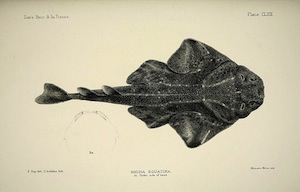U.K. Waters Grow Cooler and More Acidic
More fish accustomed to life in warm water are now being caught in British waters, while catches of some cold-water species have fallen by half.
By Alex Kirby, Climate News NetworkThis piece first appeared at Climate News Network.
LONDON — Dipping your toes in the waters around Britain has grown marginally less inviting: in the last few years the seas have grown slightly colder.
Against the background of a continued warming trend, this blip is explained by scientists as an example of the climate’s tendency sometimes to go “off trend”, and to show clear variations from the norm.
UK researchers say the average UK coastal sea surface temperature in the last decade was lower in 2008-2012 than in 2003-2007, an example of short-term variability which they say is at odds with temperature records which “continue to show an overall upward trend.”
The finding – perhaps not surprising, given the slower pace of atmospheric warming in recent years – is reported by the Marine Climate Change Impacts Partnership (MCCIP) and is published in its latest Report Card, which assesses how climate change is affecting UK waters.
MCCIP, launched in 2005, is a partnership between scientists, the UK Government and its agencies, non-governmental organisations and industry.
Local consequences
For the first time the report looks at Arctic sea-ice coverage, and agrees that a long-term decline is clearly apparent, with sea-ice extent retreating and the ice becoming thinner as temperatures rise. It says the overall warming trend of recent decades is expected to continue.
It emphasises the importance of local-scale impacts, describing the movement of fish species and how non-native species are expanding their range.
It says: “International commercial landings from the north-east Atlantic of species identified as warm-adapted (e.g. grey gurnard, red mullet, hake) have increased 250% in the last 30 years, while landings of cold-adapted species (e.g. cod, haddock, whiting) have halved.”
The report also identifies a possible trend to smaller fish: “”Evidence is emerging that fish body-size is affected by climate change. For example, warm, lower-oxygen conditions favour smaller individuals, and by 2050 the average fish weight could be reduced by 14-24%.
Accelerating acidity
“However, there are multiple drivers of changes in size distributions including the known effects of fishing.”
One cause of change the report identifies with high confidence is growing ocean acidification. It says: “The current rate of increase in acidity… is probably more rapid now than any time in the last 300 million years.”
The researchers say changes to primary fish production are expected throughout the UK, with southern regions (for instance the Celtic Sea and English Channel) becoming up to 10% more productive and northern regions (like the central and northern North Sea) up to 20% less so.
But they acknowledge “some challenges” in identifying the impacts of climate change. These challenges are caused by difficulties in distinguishing both between short-term variability and long-term trends, and between climate influences and other pressures.
Over 150 scientists from 55 UK science organisations contributed to the report, which covers a range of 30 marine and coastal topics. The detailed peer-reviewed briefings on all the topics covered in the summary series are available online. The 2013 Report Card and the 33 topic reports will be available online shortly after publication.
Your support matters…Independent journalism is under threat and overshadowed by heavily funded mainstream media.
You can help level the playing field. Become a member.
Your tax-deductible contribution keeps us digging beneath the headlines to give you thought-provoking, investigative reporting and analysis that unearths what's really happening- without compromise.
Give today to support our courageous, independent journalists.






You need to be a supporter to comment.
There are currently no responses to this article.
Be the first to respond.